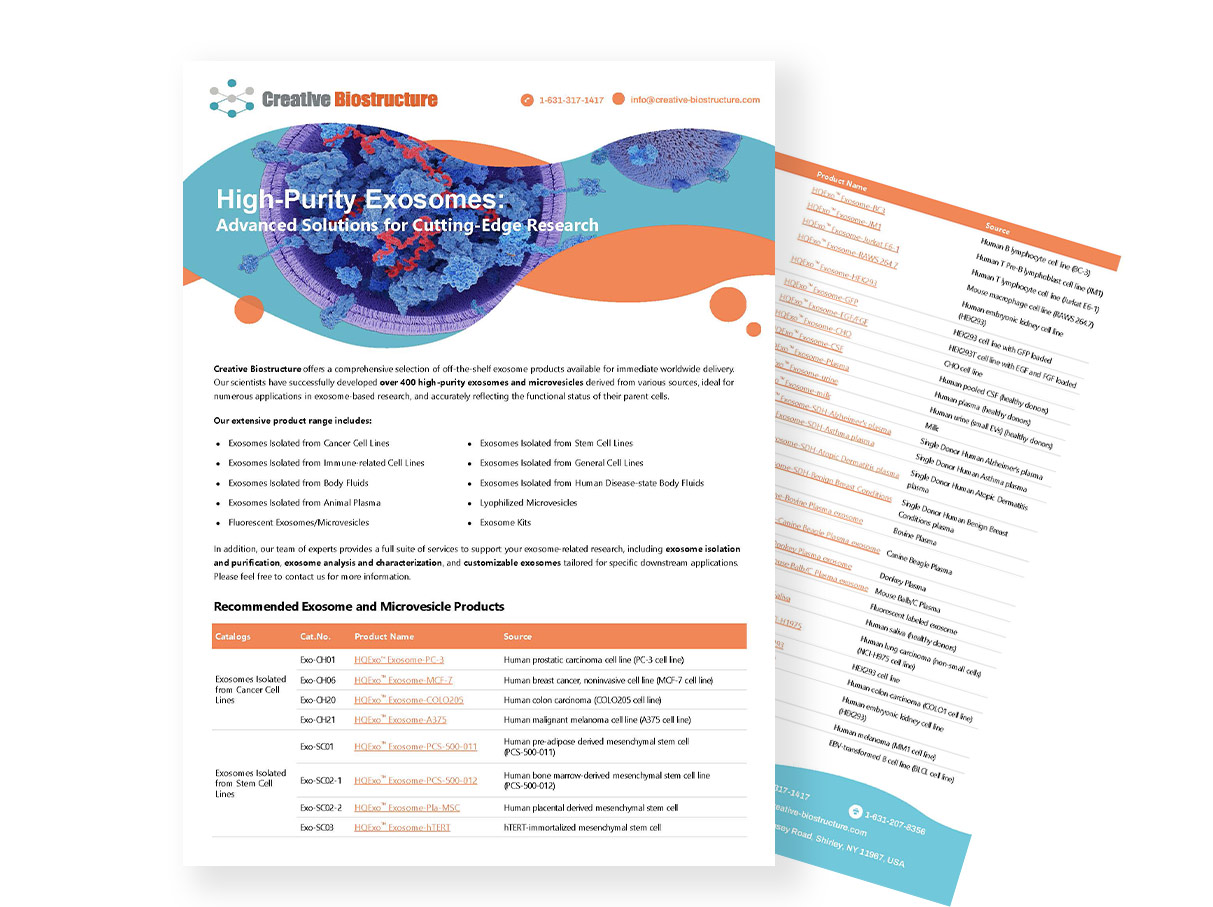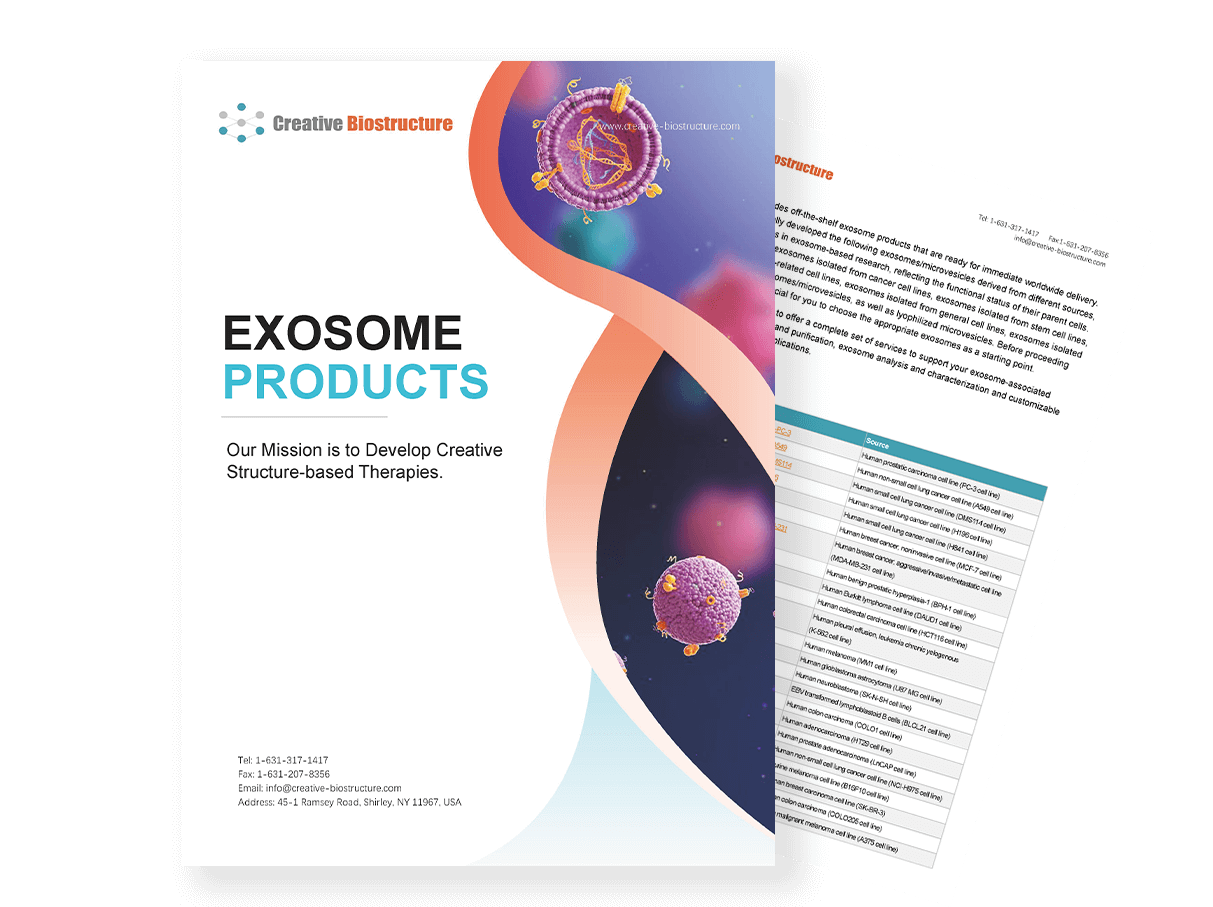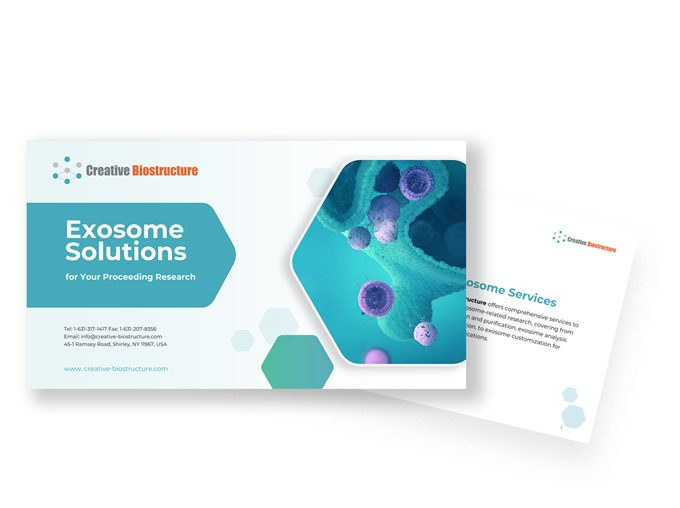Exosomes Isolated from General Cell Lines
At Creative Biostructure, we provide exosome products derived from general cell lines, which guarantee higher purity and meet rigorous standards required for downstream analyses. Our exosomes undergo ultracentrifugation to ensure optimal purity, while additional characterization through Nanoparticle Tracking Analysis (NTA) and ELISA/WB further confirms their high quality. For specialized applications, we offer fluorescently labeled exosomes, providing a clear and long-lasting signal that enhances the visualization of exosome trafficking in live-cell experiments. Additionally, we offer customized exosome extraction services to meet unique experimental needs.
Product List
Background
Exosomes are small extracellular vesicles (EVs) that play pivotal roles in intercellular communication, disease progression, and hold significant therapeutic potential. Isolation of exosomes from well-characterized cell lines, such as the Chinese Hamster Ovary (CHO) cell line and human embryonic kidney (HEK293) cell lines, including the HEK293T variant, has become an essential component of scientific research. These cell line-derived exosomes offer consistent quality and biological relevance, making them indispensable tools. They serve as reliable positive controls in exosome isolation protocols and are instrumental in functional studies across key assays, including Enzyme-Linked Immunosorbent Assay (ELISA), Fluorescence-Activated Cell Sorting (FACS), and Western Blotting (WB). The high demand for these standardized exosome products is driven by their extensive applications across various fields of biomedical research.
Product Types
Creative Biostructure offers a range of exosome products sourced from widely used cell lines:
- CHO Cell Line Exosomes: CHO cells are commonly used for large-scale protein production. Exosomes derived from CHO cells are particularly valuable in biopharmaceutical research due to their capacity to mirror key cellular mechanisms.
- HEK293 Exosomes: HEK293 cells, a standard tool in cell biology, offer exosomes that are widely used as positive controls in various functional assays, such as ELISA, FACS, and WB. These exosomes serve as a reference standard in numerous research fields, including cancer biology and regenerative medicine.
- HEK293T Cell Line Exosomes: HEK293T cells, a modified version of HEK293, provide exosomes that are highly valuable for gene expression studies, including the study of RNA and protein cargoes in exosome research.
Additionally, we offer fluorescently labeled exosomes from these cell lines, providing a visible and traceable means for studying exosome pathways and cargo transfer.
Application Scenarios
- ELISA: Exosomes can be used in ELISA to detect specific proteins, nucleic acids, or lipids associated with disease biomarkers. Using exosomes derived from HEK293 or CHO cell lines ensures reproducibility, which is essential for comparative studies and the development of diagnostic tools.
- FACS: The presence of surface markers on exosomes can be analyzed using flow cytometry. Exosomes labeled with fluorescent dyes allow for direct tracking of exosome-cell interactions in real time, facilitating deeper insights into their roles in cell signaling.
- Western Blotting: Exosome proteins can be separated and identified using WB, a technique commonly applied in proteomics. With exosomes from general cell lines like HEK293T, researchers can investigate the exosome cargo in both normal and disease states.
- Fluorescent Labeled Exosomes: Fluorescent labeling has revolutionized the study of exosome dynamics. Exosomes labeled with fluorescent dyes can be tracked via fluorescence microscopy to monitor exosome cargo delivery, cellular uptake, and distribution.
Case Studies
Case Study 1: Exosomes from HEK293 Cell Lines in Angiogenesis Research
In this study, researchers used exosomes from genetically modified HEK293 cells overexpressing carbonic anhydrase 9 (CA9) to explore their role in angiogenesis. After isolating exosomes from both parental and CA9-expressing HEK293 cells and characterizing them for CA9 and exosomal markers, they discovered that CA9-containing exosomes significantly enhanced migration and tube formation in human umbilical vein endothelial cells (HUVECs), without affecting cell proliferation. This finding underscores the functional significance of exosomes in angiogenesis, particularly those from CA9-expressing cells, and highlights their potential in modulating endothelial cell behavior.
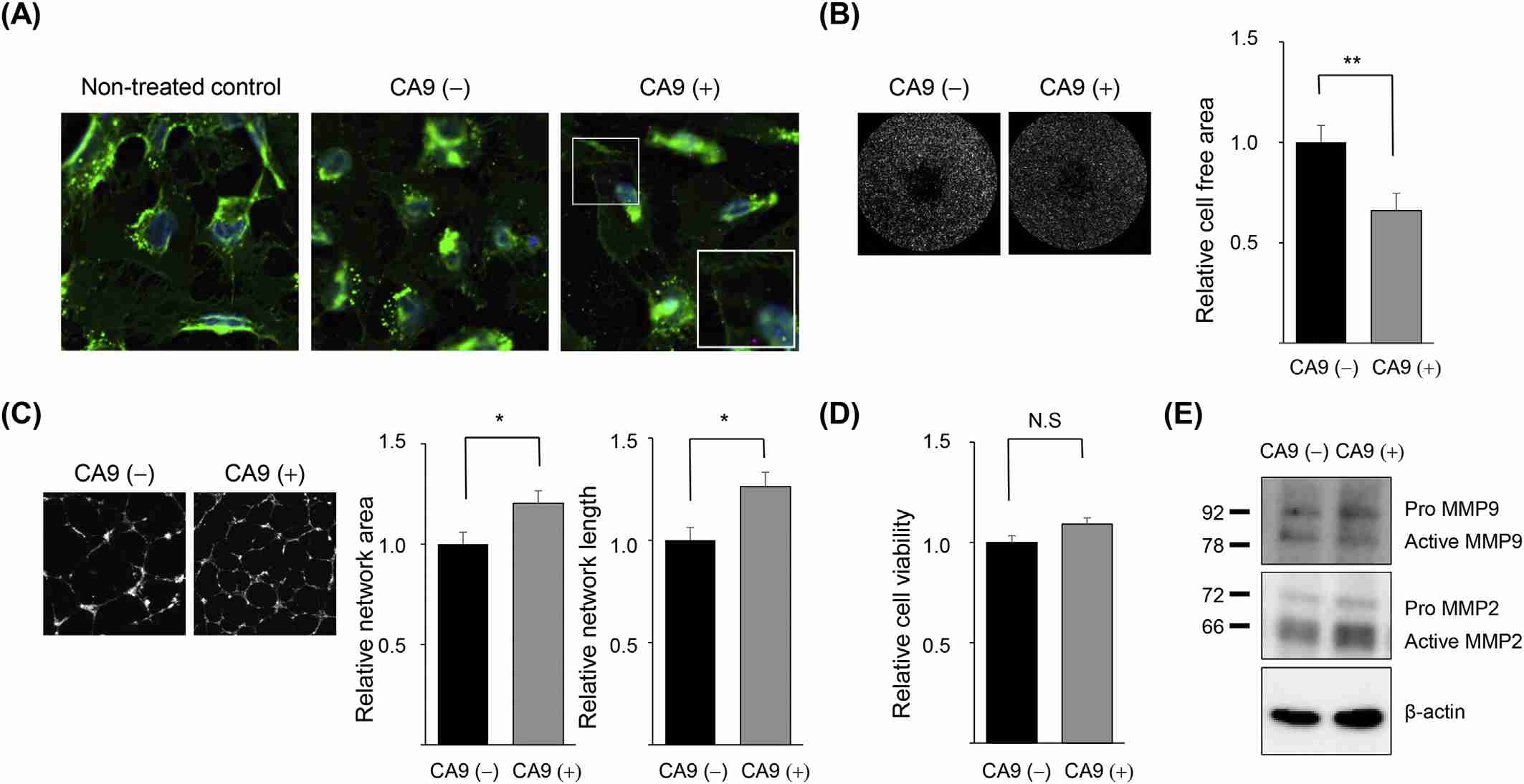 Figure 1. Immunocytochemistry was used to visualize the uptake of exosomes derived from HEK293 and CA9-expressing HEK293 cells by HUVEC. Exosomes labeled with CA9 were successfully internalized by the endothelial cells, promoting cell migration and tube formation, key steps in angiogenesis. Western blot analysis further confirmed the induction of MMP2 expression following CA9 exosome treatment, highlighting their role in enhancing vascular network development. (Horie K, et al., 2017)
Figure 1. Immunocytochemistry was used to visualize the uptake of exosomes derived from HEK293 and CA9-expressing HEK293 cells by HUVEC. Exosomes labeled with CA9 were successfully internalized by the endothelial cells, promoting cell migration and tube formation, key steps in angiogenesis. Western blot analysis further confirmed the induction of MMP2 expression following CA9 exosome treatment, highlighting their role in enhancing vascular network development. (Horie K, et al., 2017)
Case Study 2: Exosomes from HEK293T Cell Lines
In this study, exosomes were harvested from HEK293T cells after stable transfection with a lentiviral vector encoding the LAMP2b-DARPins fusion protein. Following transduction, the exosomes were isolated using differential ultracentrifugation. The exosomes, with an average size of 90 nm as measured by zeta sizer and confirmed by TEM analysis, were used to study their binding affinity for Her2 receptors on target cells. Western blot analysis confirmed the expression of the LAMP-DARPins protein on the exosome surface. These exosomes exhibited strong interaction with Her2-expressing cells, demonstrating their potential for diagnostic and therapeutic applications in Her2-positive cancers, such as breast and ovarian cancer.
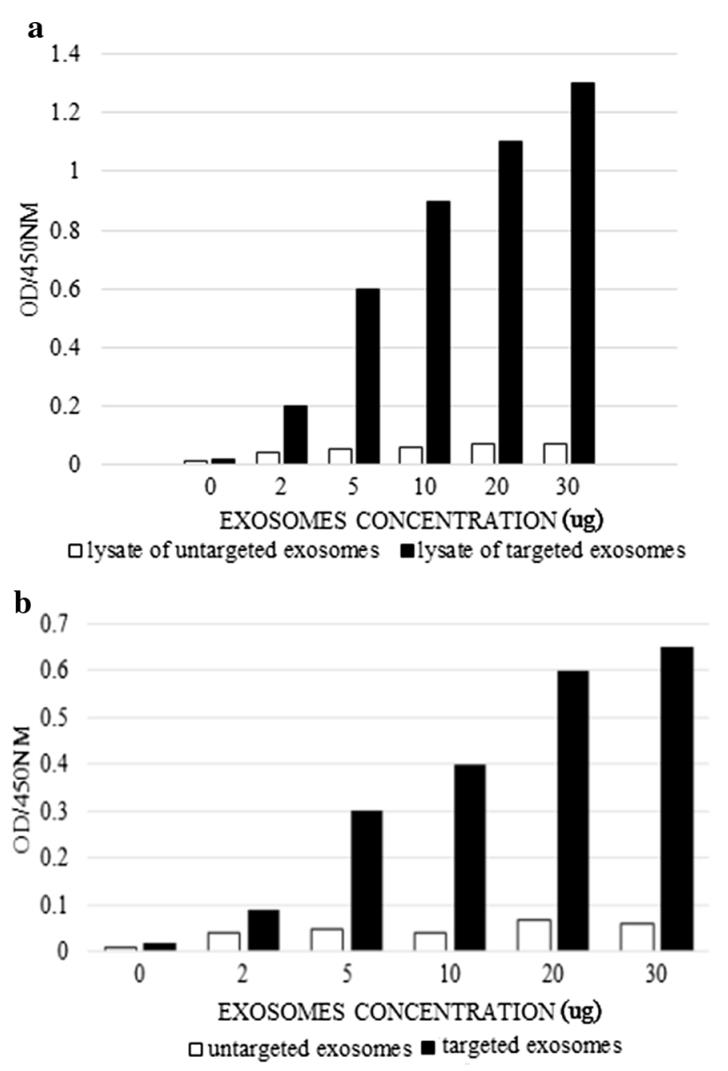 Figure 2. Cell ELISA for exosome interaction with Her2 receptors. Exosomes expressing LAMP-DARPins showed strong binding affinity for Her2 receptors in the cell ELISA assay, as indicated by a significant increase in optical density when compared to control exosomes. (Khodashenas S, et al., 2019)
Figure 2. Cell ELISA for exosome interaction with Her2 receptors. Exosomes expressing LAMP-DARPins showed strong binding affinity for Her2 receptors in the cell ELISA assay, as indicated by a significant increase in optical density when compared to control exosomes. (Khodashenas S, et al., 2019)
Product Advantages
Exosome isolation and characterization are critical to ensuring reproducibility and accuracy in research. At Creative Biostructure, our exosome products stand out due to their high purity and quality, achieved through advanced ultracentrifugation techniques. These exosomes are characterized by NTA, ensuring precise measurement of particle size and concentration, as well as by ELISA and Western Blotting, verifying the presence of key exosomal markers.
Key Advantages
- Purity and Quality Assurance: Our ultracentrifugation protocols are optimized to remove contaminants and ensure the exosomes are of the highest quality. This is particularly important for downstream applications, where purity can affect experimental outcomes.
- Fluorescent Labeled Exosomes: The fluorescent exosomes we provide offer long-lasting, visible signals that can be tracked through live-cell imaging, facilitating studies in cargo delivery, exosome dynamics, and cellular communication.
- Customizable Services: For researchers with specific needs, we offer flexible and customized exosome isolation and labeling services. Whether you require exosomes from a particular cell line or specific fluorescent labeling, our team can provide solutions tailored to your experimental requirements.
Resources
Frequently Asked Questions
-
How do I choose the right exosome product based on the cell line?
The choice of exosome products largely depends on your research focus. If your research involves genetic studies, HEK293T exosomes are recommended due to their use in gene expression analysis. For general cellular research or as positive controls, HEK293 exosomes are highly versatile.
-
What makes fluorescently labeled exosomes valuable?
Fluorescent labeling enables researchers to visualize exosome trafficking and cargo delivery in real-time. This feature is particularly useful in drug delivery studies, allowing for the precise tracking of exosome interactions within living systems.
-
Can you customize exosome products to meet specific research needs?
Yes, we offer highly customizable exosome solutions. Whether you need exosomes from a rare cell line, specific cargo modifications, or tailored fluorescent labeling, our team works closely with clients to develop products that meet precise experimental requirements.
At Creative Biostructure, we provide premium exosome products from general cell lines that meet your research needs. Contact us today to discuss your project requirements and discover how our solutions can accelerate your scientific breakthroughs.
References
- Horie K, Kawakami K, Fujita Y, et al. Exosomes expressing carbonic anhydrase 9 promote angiogenesis. Biochemical and Biophysical Research Communications. 2017. 492(3): 356-361.
- Khodashenas S, Khalili S, Forouzandeh Moghadam M. A cell ELISA based method for exosome detection in diagnostic and therapeutic applications. Biotechnology Letters. 2019. 41: 523-531.
